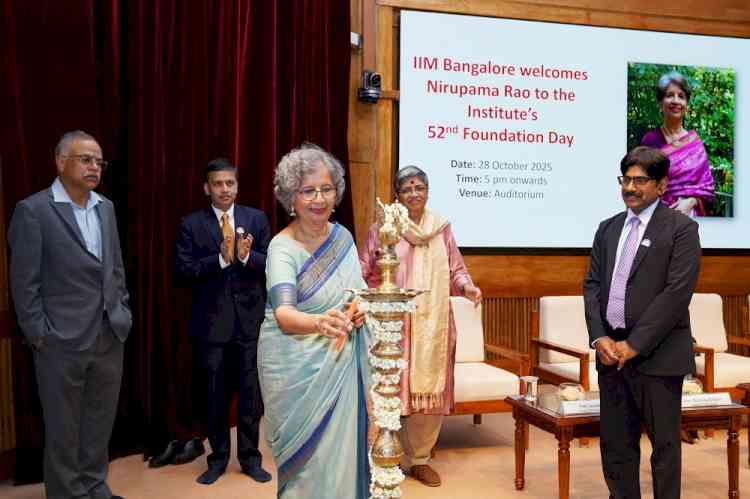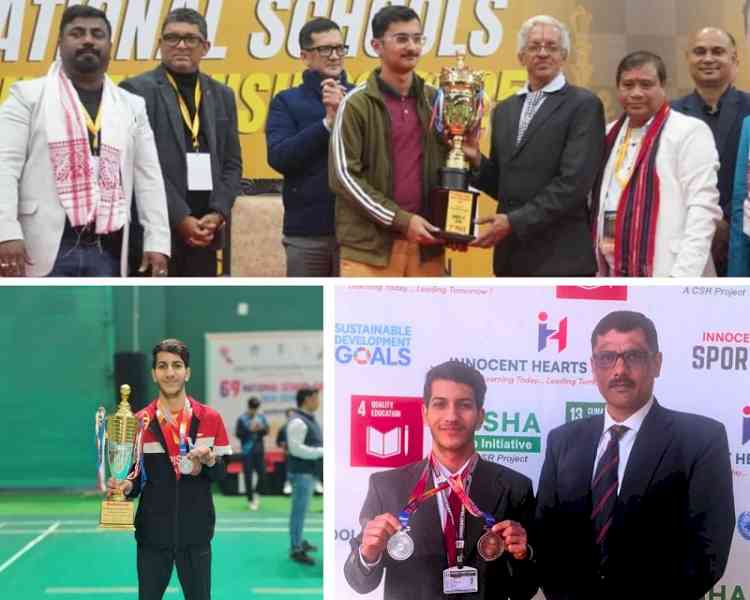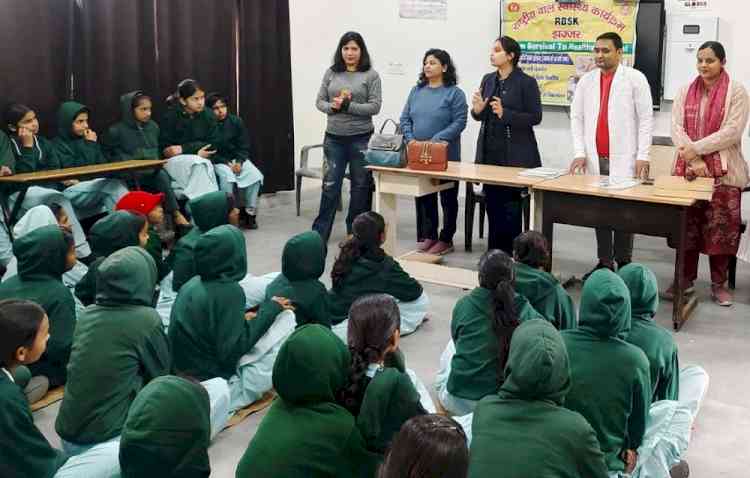“Trust not a sentiment, but a strategy, in the evolving world order”: Nirupama Rao
In her Foundation Day lecture at IIMB on ‘Beyond Borders: Preparing for a World in Transition’, the former Foreign Secretary of India explains how the world is undergoing an era of re-globalization – built on diversification, trusted partners and shock-resistant systems

Bengaluru, October 28, 2025: “The vocabulary of global affairs has shifted, and IIM Bangalore has the heritage and capacity to lead this shift. IIMB graduates already influence policy, build institutions, scale companies, and strengthen civil society. This institution has always produced builders – of ideas, of enterprises, of institutions that last”, observed Nirupama Rao, former Foreign Secretary of India, while delivering the Foundation Day lecture on, ‘Beyond Borders: Preparing for a World in Transition’, during IIM Bangalore’s 52nd Foundation Day celebrations, earlier today. The entire IIMB community, comprising students, faculty, former faculty, alumni and staff, were part of the event which included speeches, awards, and much more.
A former Indian diplomat, Nirupama Rao was Foreign Secretary to the Government of India (2009-2011). She was the first woman spokesperson (2001-02) of the Indian Foreign Office. She served as India's first woman High Commissioner (Ambassador) to Sri Lanka (2004-2006) and to the People's Republic of China (2006-2009). She was Ambassador of India to the United States from 2011 to 2013. In retirement, she has taught at Brown and Columbia Universities, was a Fellow at The New School in New York, and a Public Policy Fellow at the Wilson Center in Washington D.C. She is also the Vice Chairman of Tibet House, New Delhi, the Cultural Centre of His Holiness the Dalai Lama. Her book titled, ‘The Fractured Himalaya: India Tibet China 1949-1962’, was published in 2021.
Leadership guided by integrity, empathy, courage, responsibility and public purpose
A seasoned diplomat with extensive knowledge, skills and proficiency in a variety of fields, Nirupama Rao explained the current state of geopolitics. “Geopolitics today is no longer about territory and force alone – supply chains are the new borders; technology the new territory; data the new diplomacy; climate the new conflict line and narrative the new battleground. In short, geoeconomics now determines corporate destiny. New-age leaders must be geopolitically literate. Economically, we have moved from a world optimized for efficiency to a world reorganized for resilience. This is not de-globalization, but re-globalization, built on diversification, trusted partners, and shock-resistant systems.”
“The world’s operating system is moving toward multipolarity, and power is no longer stored in one capital or expressed through one model. India has been pivotal in this shift, and this is why India’s presidency of the G20 mattered – it was a moment of realignment with India shaping the narrative.”
Stating that the world’s changing order is common knowledge, she added that the real question was whether the country will shape this transition or be shaped by it. “India has an ecosystem that combines democratic stability, demographic vitality, digital inclusion, and a deepening manufacturing base. We are moving from the back office of the world to being the digital architect of the world, and increasingly, we could be and must become, the production platform for the world. The world is not looking at production that is the cheapest, but one that is the safest.”
Her talk also explored the decisive capitals of tomorrow, which she said, will not be financial capital alone. “They will include trust capital, data capital, demographic capital, climate capital and cultural capital. India has strengths across all five.” She also made special mention of integrity and accountability, in the context of leadership as well as in the face of the challenges brought about by advanced technology. “Leadership in technology must be ethical. We must therefore lead not only in AI development but in AI governance, which must be transparent, accountable and human-centered. Technology must serve humanity, not replace it. And ethics should not be limited to the confines of compliance. India can help frame the answers by anchoring innovation to humanity.”
The issue of climate change featured prominently in her address. “Climate change now determines economic destiny and national security. The climate discourse must move from guilt to responsibility and from pledges to execution. Sustainability must become the language of business, not only of policy.” She also stressed on the role of women for boosting economic, social and political progress for all. “Women’s leadership is not a social add-on; it is a strategic imperative”, she pointed out.
Nirupama Rao suggested that India’s development journey, being robust, can offer a framework that others can adopt – democracy that delivers, development that includes and digital for public good. “Leadership must return to the principles of integrity, empathy, courage, responsibility and public purpose. Leadership begins with respect, and not entitlement. Although profit is not illegitimate, but profit without purpose is incomplete. Logic without empathy becomes indifference. India is no longer waiting to be invited to shape the global agenda. India wants to co-author the script. Our purpose is development as justice, growth that broadens opportunity and deepens dignity. The collective dream is that of a nation that refuses to leave anyone behind. In a world that often speaks the language of fear, India insists on the grammar of hope – backed by competence, courage and openness.”
Drawing a comparison between leadership and literature, she said that true leaders are not the ones who have most of the answers, but those who remain curious the longest. “Power is not what you simply possess, but it is what others entrust you with.”
She urged higher education institutes like IIM Bangalore to move from teaching problem-solving to cultivating future-building. “The world needs leaders who are economically intelligent and geopolitically aware; technologically fluent and ethically grounded; data-driven and human-centred; competitive in markets and collaborative across borders; ambitious in goals and anchored in purpose. The age of single-discipline leadership is past. This is the age of integrated leadership – leaders who translate across domains. An enlightened India shaped by knowledge, justice and human dignity is our collective responsibility, where intellect is valued, inquiry is free, and humanism is a lived ethic.”
She offered a leadership compass for a world in transition, led by hope and backed by competence and courage. “Diversity is not a weakness, but a power to be unleashed. Where you come from is no indication of where you can go. Lead beyond borders, design for impact, choose character over convenience, solve for humanity, build resilience before scale, let purpose be your strategy, and celebrate courage. Learn from global best practices, learn to listen attentively and incorporate Visvavidya into your plans for the future. Public service is the bridge to your future…and progress must not come at the cost of dignity.”
Calling the IIMB student community the architects of the new era, she shared what she called ‘civilizational values’. “You are not only future managers; you are trustees of India’s next quarter century. Hence, choose to lead with courage and humility, with innovation and integrity, with ambition and empathy. Let us build markets that reward responsibility, technologies that expand dignity, and institutions that outlast the moment. Build something worthy of this moment, this nation, and the future that is counting on you. India believes in you, and it is your turn to lead now.”
Her engaging address was followed by a Q&A session, moderated by Prof. Sourav Mukherji, Dean, Faculty and Alumni Relations & Development, and faculty of the Organizational Behavior & Human Resources Management area, during which Nirupama Rao recommended building comprehensive national strength to navigate the challenges brought about by the transition that the world is going through currently.
Address by the Director In-charge
Prof. U Dinesh Kumar, Director In-charge, IIM Bangalore, during his address, acknowledged the support that the Institute continues to receive for all its activities from the Central Government, specifically the Ministry of Education as well as other departments, and the Government of Karnataka. “Also exemplary are the contributions of all our brand ambassadors – the illustrious alumni, immensely talented faculty, our dear students and dedicated staff, whose concerted efforts continue to enhance IIM Bangalore’s global standing among leading management schools across the world”, he added.
He went on to highlight IIM Bangalore’s major accomplishments over the past year, including its brilliant rankings, new UG programmes and Centres, the newly set up IIMB Development Foundation which is the fundraising and development arm of the Institute, the prestigious national and global conferences that the Institute continues to host, the valuable partnerships with government bodies, academic institutions and corporations across the world, pathbreaking sustainability initiatives, as well as top achievements of faculty, students and alumni. “We have been chosen by the Joint Secretary of the Smart Cities Mission, Ministry of Housing and Urban Affairs, Government of India, to present three thematic impact studies. Five students from our BBA-DBE programme were selected for a first-of-its-kind, fully funded two-week international immersion at Hiroshima University, Japan. The initiative was coordinated by our Mizuho India Japan Study Centre. Our digital learning arm, IIMBx, has launched a FinTech Certificate Programme for Young Professionals, in collaboration with the Government of Karnataka. On World Environment Day in June, we released the IIMB Sustainability Report, which captures both retrospective insights and a forward-looking roadmap aligned with internationally recognized sustainability frameworks to maintain transparency, accuracy and accountability. We also introduced a new core course for our PGP-2 students titled, ‘Responsible Business & Sustainability.”
Prof. Dinesh Kumar shared that the Institute remains committed to not only providing world-class management education, but also to shaping minds. “We are focused on cultivating thought leadership and building leaders who can think out-of-the-box – leaders who understand the accelerating global impact of technology on industry and society, and who see business as a force for good. Creating such social change agents, nurturing skill building and entrepreneurial ecosystems through NSRCEL, promoting environmental awareness, social impact and sustainable living, working towards inclusion and diversity, contributing to the welfare of business, government and society and to the broader goal of nation-building, are milestones that make IIM Bangalore a class apart. In today’s day and age, with knowledge being the prime driver of growth, I am happy to say that IIM Bangalore is making the best out of this period of change and opportunity to reaffirm its role as a hub of ideas, innovation and impact.” He went on to introduce the Chief Guest.
Address by Prof. Malavika R Harita, Member, IIMB Board of Governors
The day’s events included an inspiring address by Malavika R. Harita, Founder & CEO, Brand Circle, and Member, IIMB Board of Governors. Drawing attention to the power of knowledge, she said, “Knowledge is the only thing you can truly own. It is a potent tool to destroy fear. Let us fix education-related problems in our country through knowledge and not by decrying systems. As educators and managers, we must also learn to leave our comfort zone, start relearning to be better guides, adapt and keep learning. Sharing knowledge can create influence and goodwill, and will change business relationships for the better.”
Talking about the future of education, she highlighted ‘tejasvi navadhitamastu’, which translates to ‘let our study be enlightening’. “This encapsulates the essence of learning and its impact”, she added.
Alumni Service Awards
The annual Alumni Service Award (ASA) was launched in 2023 as part of the Golden Jubilee celebrations, to honor past graduates who have made impactful and enduring contributions to the Institute, the IIMB Alumni Association (IIMBAA) and the broader alumni ecosystem. Each recipient receives a citation in recognition of their service and commitment. This year, the recipients of the IIM Bangalore Alumni Service Award were felicitated on the 52nd Foundation Day of IIMB. The recipients are Navin Kumar, PGP 1999; Karan Bhagat, PGP 2001, and Michael Sequeira, PGP 2010. Prof. Sourav Mukherji conducted the award ceremony and introduced the winners. Utanka Sarma, Head – Alumni Relations, was also present.
Thanking his alma mater, Karan Bhagat said that his IIMB years taught him humility, discipline, values and being open to change, and also gave him exposure to peers from diverse backgrounds. “IIM Bangalore has given me more than knowledge – it has given me a way of seeing the world. That perspective carries with it a responsibility – to give back, not just to the Institute that shaped us, but to the society that enables us.”
Describing the award as a celebration of not just his own journey, but the deep bond that the alumni share as a community, Navin Kumar thanked the IIMB faculty for their leadership, guidance and inspiration. “I am focussed on nurturing the alumni-institute ecosystem, which is a work-in-progress. We want to make our alumni ecosystem the best in the world.”
Expressing gratitude, pride and a profound sense of purpose, Michael Sequeira said that receiving the award for contributing to the establishment of the Office of Disability Services, currently the Office of Diversity and Inclusion, was deeply meaningful and a collective success. “I believe the world changes only when we choose to be the change, a timeless quote by Mahatma Gandhi that guides my life. Equity teaches us not to treat everyone the same – but to create conditions where everyone can thrive. Over the past 15 years, IIM Bangalore has listened to more than 250 students like me and acted. Today, it stands as a top choice for students with disabilities.” He also had a word of advice for the future mangers of the country. “Become the best version of yourself, give back to your alma mater, remember that society needs role models, hire persons with disabilities, and above all – be yourself, be authentic.”
This year, the Foundation Day celebrations also saw Long Service Awards being presented to non-teaching IIMB staff, for completing 10 years of service at the Institute. The awards were presented by Prof. M Jayadev, Dean, Administration, IIM Bangalore.



 City Air News
City Air News 










